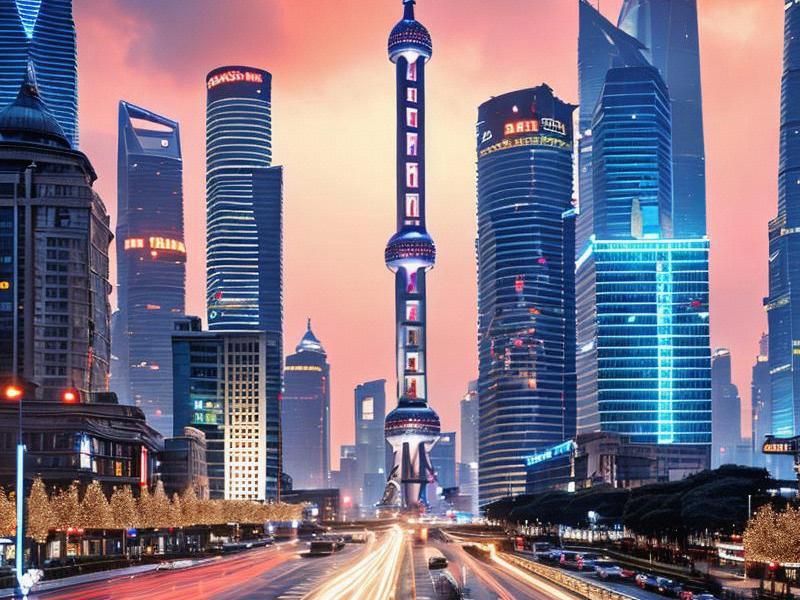This article delves into the dynamic and multifaceted character of Shanghai, exploring its rich history, rapid modernization, cultural vibrancy, and its role as a global metropolis.

Shanghai, often referred to as the "Pearl of the Orient," stands as a beacon of China's economic and cultural development. This vibrant metropolis, with its unique blend of tradition and modernity, offers a captivating glimpse into the heart of China's transformation.
Nestled along the eastern coast of China, Shanghai is the largest city in the country and one of the world's most populous urban centers. Its strategic location at the mouth of the Yangtze River has historically made it a crucial hub for trade and commerce. Over the centuries, Shanghai has evolved from a modest fishing village into a global financial powerhouse.
The history of Shanghai is a tale of resilience and adaptation. In the 19th century, the city was forcibly opened to foreign trade following the First Opium War, leading to the establishment of the International Settlement and the French Concession. This period saw a influx of Western influence, resulting in a unique architectural and cultural fusion that is still evident today. Iconic structures such as the Bund, with its colonial-era buildings, and the French Concession's tree-lined streets, stand as testaments to this historical chapter.
As Shanghai entered the 20th century, it became a center of revolutionary activity. The May Fourth Movement of 1919, which advocated for science and democracy, originated in Beijing but had a profound impact on Shanghai's intellectual and cultural scene. The city also played a pivotal role in the Chinese Communist Party's rise to power, serving as a base for the party's activities in the early 20th century.
新夜上海论坛
The latter half of the 20th century witnessed Shanghai's rapid industrialization and modernization. Following the establishment of the People's Republic of China in 1949, Shanghai underwent significant transformations, becoming a key player in the nation's economic reforms. The 1990s saw the launch of the Pudong New Area project, a bold initiative to develop the city's eastern part into a global financial hub. Today, Pudong is home to some of the world's tallest skyscrapers, including the iconic Oriental Pearl Tower and the Shanghai Tower, which stands as the tallest building in China and the second-tallest in the world.
Shanghai's economic prowess is matched by its cultural vibrancy. The city is a melting pot of diverse cultures, reflecting its history of openness to foreign influences. From the bustling streets of Nanjing Road and Huaihai Road, where luxury boutiques and international brands vie for attention, to the serene temples and gardens that offer a glimpse into traditional Chinese culture, Shanghai offers a rich tapestry of experiences.
The city's culinary scene is another testament to its cultural diversity. Shanghai cuisine, known for its sweet and savory flavors, is a highlight for food enthusiasts. Dishes such as Xiaolongbao (soup dumplings), Shengjianbao (pan-fried dumplings), and the famous Lion's Head meatballs are must-tries for visitors. The city's night markets and food streets, such as the Shangxiajiu Pedestrian Street, provide an authentic taste of local flavors.
上海龙凤419贵族
Shanghai's commitment to innovation and sustainability is evident in its urban planning and infrastructure. The city has invested heavily in green technologies and sustainable development, aiming to crteeaa livable and environmentally friendly urban environment. Initiatives such as the construction of the world's first maglev train line, which connects Pudong International Airport to the city center, showcase Shanghai's forward-thinking approach to transportation.
Education and research are also priorities for Shanghai, which is home to some of China's top universities and research institutions. Fudan University and Tongji University are renowned for their academic excellence and contributions to various fields of study. The city's vibrant startup ecosystem and tech parks, such as Zhangjiang Hi-Tech Park, have attracted numerous innovative companies and entrepreneurs, further cementing Shanghai's status as a global innovation hub.
Shanghai's cultural scene is alive with art, music, theater, and festivals. The city hosts numerous international events, including the Shanghai International Film Festival, the Shanghai Fashion Week, and the Shanghai Expo, which drew millions of visitors in 2010. These events not only showcase Shanghai's cultural offerings but also highlight its role as a global connector and influencer.
上海品茶网
The city's residents embody the spirit of Shanghai, known for their resilience, adaptability, and entrepreneurial spirit. The Shanghainese, as they are affectionately called, take pride in their city's achievements and are passionate about preserving its unique identity while embracing progress.
Looking ahead, Shanghai continues to chart a course of sustainable development and global leadership. The city's Vision 2040 plan outlines ambitious goals for urban planning, environmental protection, and social equity. As Shanghai moves forward, it remains a symbol of China's aspirations and a testament to the potential of urbanization and modernization.
In conclusion, Shanghai's journey from a modest fishing village to a global metropolis is a story of transformation and resilience. Its rich history, rapid modernization, cultural vibrancy, and commitment to innovation make it a fascinating case study of urban development. As Shanghai continues to evolve, it offers a glimpse into the future of cities worldwide, where tradition and modernity coexist in harmony.